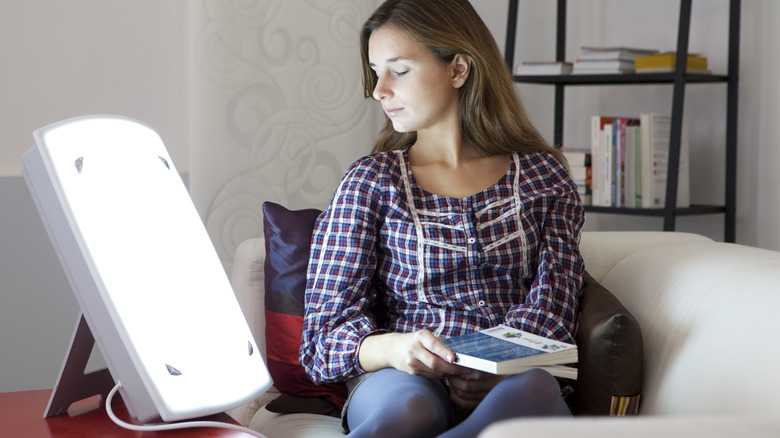Seasonal Affective Disorder May Affect More People This Year. Here's How To Prevent And Manage It
Seasonal affective disorder is sometimes referred to as the winter blues. It is a kind of depression that typically comes on in the fall and winter months and goes away in the spring or early summer, according to Healthline. This year, in the wake of the COVID-19 pandemic, it might be more common. Knowing signs to look for and how to treat it can be the key to managing any mood changes that come with the seasons.
Seasonal affective disorder (SAD) is a mood disorder that can cause depression as the seasons shift, typically when we get less daylight each day (via Mayo Clinic). The decrease in sunlight can cause a drop in serotonin, which can create feelings of depression. Symptoms include feeling listless, having low energy, losing interest in things you used to enjoy, having trouble concentrating, sleeping too much, and feeling hopeless. Approximately 5% of Americans experience SAD each year, and 4 out of 5 people who have seasonal depression are female, according to Mental Health America.
This year, more people's mental health has been affected in the wake of the pandemic (via Healthline). We're still processing the events of the last couple of years, and psychotherapist Heather Darwall-Smith told Healthline that adding SAD to an already taxed system may overwhelm those who weren't sad until now. Worries about factors like climate change and the economy can also add to our mental health plates.
How you can manage symptoms of SAD
While SAD can't necessarily be prevented, there are a few things you can do to manage any symptoms that may come up, especially if you get ahead of them early (via Mayo Clinic). If you can predict when your symptoms might begin, you can prevent them from becoming too unmanageable. Getting treatment as soon as possible — even before the seasons change — is a way you can keep symptoms from worsening.
Treatment can include light therapy, which involves sitting in front of a special light therapy box that gives out very bright light for about 20 minutes each morning, according to the American Psychiatric Association. Talk therapy can be helpful, along with medications, like antidepressants. Getting outside for exposure to sunlight during the day is important for balancing out the short days. Continuing to take good care of yourself is always important, but it's especially critical during these seasonal changes. Focus on moving your body, getting enough sleep, connecting with loved ones, and eating well as the days get shorter.


